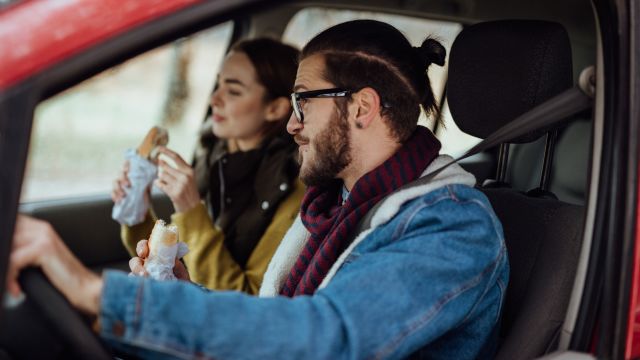Updated on June 21, 2023.
In the midst of traveling, your thoughts are typically set on the destination ahead—not on the food you’ll eat along the way. But when hunger strikes, it’s often easier to make a pit stop at the first drive-through you see. And that can be unhealthy. Typical road-trip fare, like chips, candy, or French fries, contain between 150 and 220 calories in a small serving and are high in sugar and fat.
It is possible to eat on the go without compromising a well-balanced diet built around fruits, veggies, whole grains, and protein. But it takes a bit of planning. Jessica Gascoigne, MS, RD, a Washington, D.C.-area registered dietitian, recommends packing healthy snacks, scoping out airport establishments, and being conscious about menu choices.
“I think it's really important to try and think ahead,” she says. "If you're able to take five minutes to plan where you're going or the length of time it's going to take to get there, it really will help you choose the right foods."
What to pack
Packing healthy food is a good way to avoid reaching for unhealthy options, but what’s best to pack? Staying hydrated is important to keeping your energy levels up, so bring a water bottle when you travel. A refillable water bottle helps you save money and cut down on waste. Just be sure to empty it before heading through airport security.
Think of snacks that travel well, like string cheese, nut butters, homemade trail mix, fruits, and veggie sticks.
“Try to balance a carbohydrate with a protein while you're traveling, because the protein is going to keep you satisfied longer,” Gascoigne says. Pair an apple with a part-skim string cheese, a graham cracker with a tablespoon of peanut butter, or a cup of carrots and celery with two tablespoons of hummus for a tasty balance of carbs and protein.
Making healthy choices
It’s okay to stop at that fast food joint, gas station, or airport newsstand. You just need to know what to choose.
Convenience stores and newsstands do often carry healthy options, like pre-packaged hummus with veggies, cheese and crackers, and trail mix. Be sure to check nutrition labels.
A single snack serving should contain roughly 100 to 200 calories, less than 230 milligrams of sodium, and less than 35 percent of calories from fat.
And beware of added sugars. A good rule of thumb is to avoid snacks that list some type of sugar as one of the first few ingredients.
If the drive-through or a fast food restaurant is your only option, it is still possible to eat well. Steer clear of combination meals listed on the menu and create your own. Opt for small, grilled sandwich options, like chicken breast, and pile on extra veggies. Ask for extra lettuce at the burger joint and create your own lettuce wrap. And stick with a single patty. Fried burgers with more than one patty can run you 800 calories.
Many establishments offer salads, fruit cups, sliced apples, and even yogurt. Assemble a meal using these elements, skipping high-fat dressings, cheese, and mayonnaise. Before placing your order, check the nutritional value of foods, which you can find online. Many restaurants even include calorie counts on their menus.
Complete your meal with water or low-fat milk instead of a 12-ounce soda, which typically contains about 135 calories and up to 35 grams of sugar.
If you need a coffee to power you through your travels, don’t opt for a sugary latte or blended coffee. A vanilla latte from one popular coffee chain has almost 300 calories and 35 grams of sugar. Instead, opt for a regular coffee. Even with a splash of milk and a pump of sugar-free syrup, it's a lot lower in calories.
Remember moderation
Moderation is key for frequent travelers. “Everything in moderation—including those really terrible things everyone believes about fast-food restaurants,” Gascoigne says. “If you really want French fries, get a small order. Or get a small fry and a fruit cup.”
Many Americans spend hours behind the wheel each day, yet we often aren't mindful of the foods we eat while in the car. If you’re not making healthy choices while commuting, those travel snacks can add up, so be sure to remember any car munchies.
Using a food-tracking app is an easy way to keep tabs on your diet. An app like Sharecare (available on iOS and Android) allows you to track the quality and quantity of daily meals and snacks. Just be sure to keep your eyes on the road. Any tracking can wait until you reach your destination.






